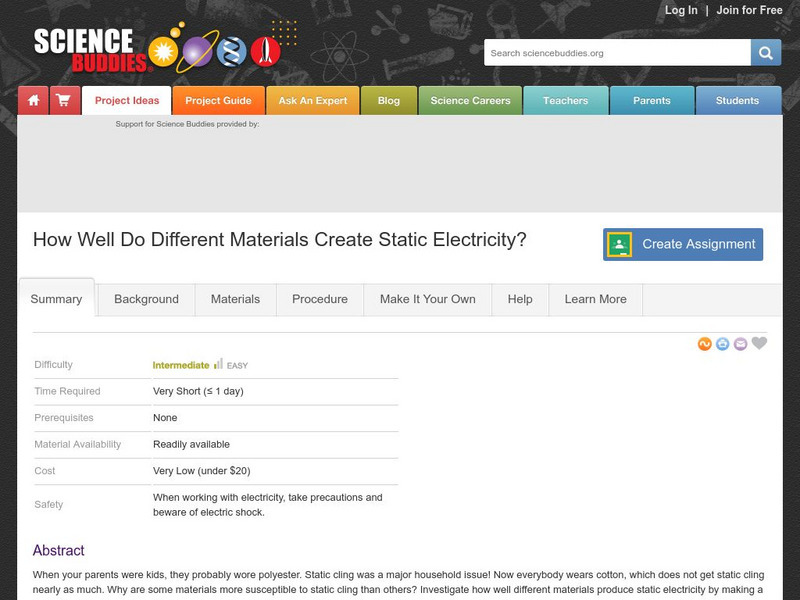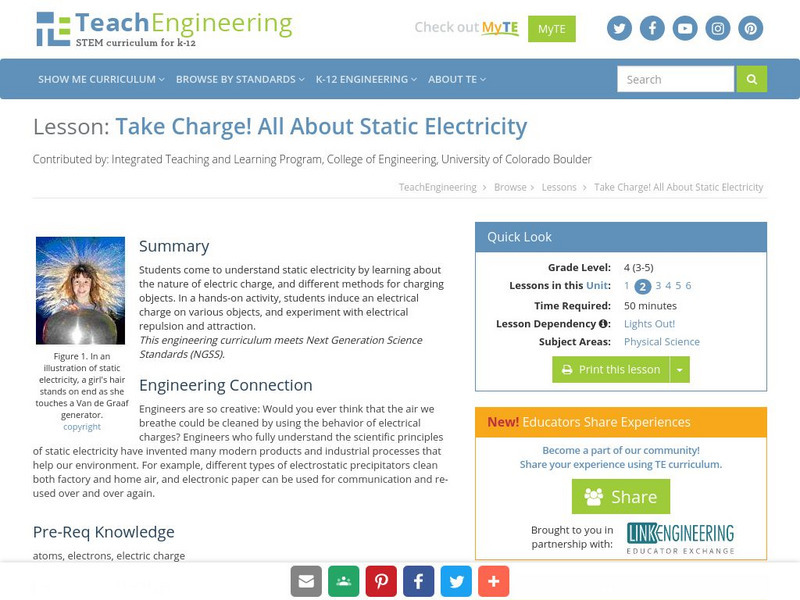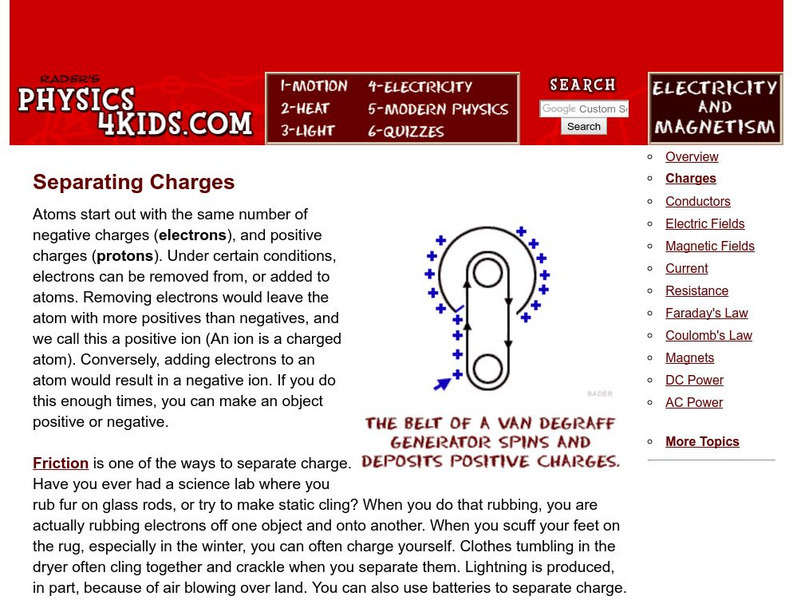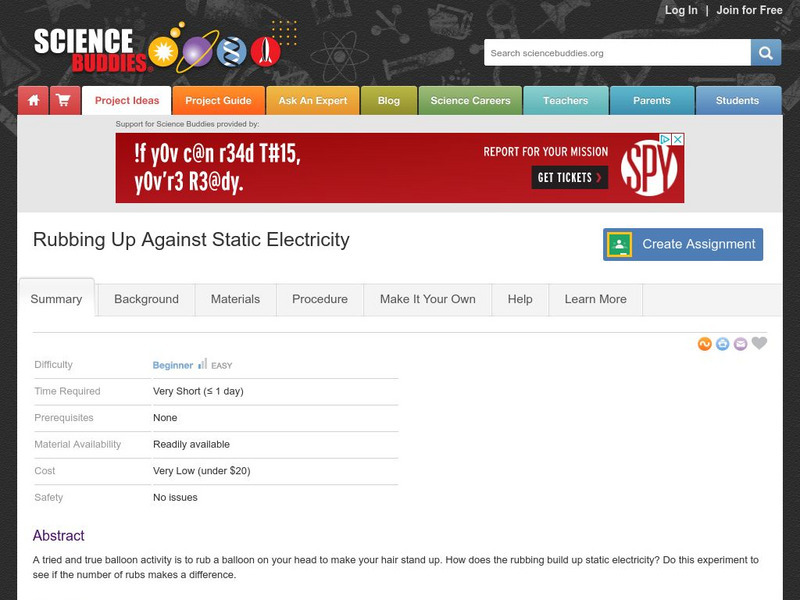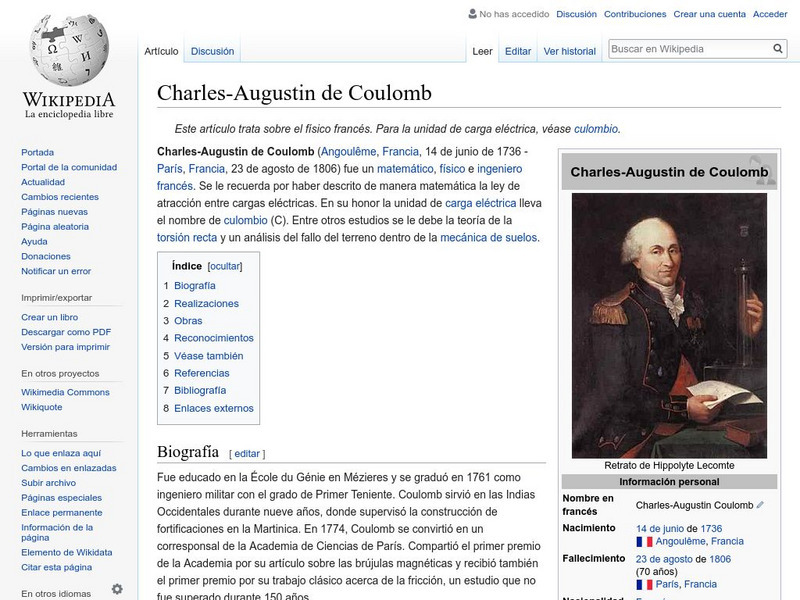Hi, what do you want to do?
Science Buddies
Science Buddies: How Do Different Materials React to Static Electricity?
Polyester clothing was generally accepted as a popular trend in fashion at one point in history. Now everybody wears cotton, which doesn't get static cling nearly as much. Why are some materials more susceptible to static cling than...
Physics Classroom
The Physics Classroom: Power: Putting Charges to Work
In this tutorial the concept of how electrical energy is transformed is introduced. Learn how electric charges actually work and take the interactive quiz to assess your understanding.
Physics Classroom
The Physics Classroom: Static Electricity: Lesson 2: Charging by Friction
Understand how to electrically charge an object by friction with this detailed description. Classrooms will benefit by extending the lesson with the interactive opportunity and follow up for comprehension with the "Check Your...
Other
Easyphysics: Chapter 11 Electric Forces
Learners investigate electric forces. Some topics examined are conductors, Coulomb?s law, and net electrical charge. The resource includes example problems with solutions and a chapter quiz.
TeachEngineering
Teach Engineering: Take Charge!
Students come to understand static electricity by learning about the nature of electric charge, and different methods for charging objects. In a hands-on activity, students induce an electrical charge on various objects, and experiment...
CK-12 Foundation
Ck 12: Third Grade Science: Physical Science: Static Electricity
[Free Registration/Login may be required to access all resource tools.] Discusses electric charge and electric force, and identifies ways that electric charge is transferred.
Physics4kids
Physics4 kids.com: Charge It Up
Discover the science behind electrical charges. This brief overview describes changes in atoms that lead to the formation of electricity. Explanations are also provided for the topics of electrostatics and electric forces. The whole...
Orpheus Books
Q Files: Electricity and Magnetism: Electric Charge
Learn how electric charges work and about Coulomb's Law, which is used to calculate the strength of an electric force.
Interactive Mathematics
Interactive Mathematics: Electric Charges
An example is presented to show how integration is used to determine the force between electric charges. A detailed solution is provided.
University of Colorado
University of Colorado: Ph Et Interactive Simulations: Electric Field of Dreams
Play ball! Add charges to the Field of Dreams and see how they react to the electric field. Turn on a background electric field and adjust the direction and magnitude. (Kevin Costner not included). Java required.
Concord Consortium
The Concord Consortium: How Do I Know if Something Is Positively or Negatively Charged?
In this learning module from The Concord Consortium, students will learn how to figure out whether an object has a positive or negative charge.
Concord Consortium
The Concord Consortium: What Effect Do Charged Objects Have on Uncharged Objects?
In this learning module from The Concord Consortium, students will will explore how uncharged objects interact with charged objects.
Science Buddies
Science Buddies: Where There Is Charge, There Can Be Sparks!
In this short science project you will learn how to build a capacitor using common household items. By testing different charge cycles, you will work to discover how much charge is stored in a Leyden jar capacitor.
CK-12 Foundation
Ck 12: Physics Simulation: Electric Ice Sheet
Balance electric charges to prevent Tommy from slipping into icy water. You are presented with 4 particles, each with a charge value. Using the plus/minus scrollbar, you can change the value of the highlighted charge. Then press the play...
Physics Classroom
The Physics Classroom: Static Electricity: Lesson2 Grounding Removal of a Charge
How do objects become grounded? Probe into the science behind "grounding" objects by removing an electric charge. Explore the Charge Interactive and test understanding with the three follow-up questions.
University of Colorado
University of Colorado: Ph Et Interactive Simulations: Charges and Fields
Move point charges around on the playing field and then view the electric field, voltages, equipotential lines, and more. It's colorful, it's dynamic, it's free.
Exploratorium
Exploratorium: Science Snacks: Physics/electricity & Magnetism
Exploratorium Science Snacks are miniature science exhibits and experiments that can be made with common, inexpensive, easily available materials. These electricity snacks represent a set of devices that you can build and experiment with...
Science Buddies
Science Buddies: Rubbing Up Against Static Electricity
A tried and true balloon activity is to rub a balloon on your head to make your hair stand up. Learn how the rubbing builds up static electricity using this experiment to see if the number of rubs makes a difference.
University of Colorado
University of Colorado: Ph Et Interactive Simulations: Balloons and Static Electricity
Investigate static electricity by rubbing a balloon on a sweater and observing what happens. Try it with two balloons. See the positive and negative charges that illustrate why there is attraction or repulsion between the balloons, the...
Physics Classroom
The Phyics Classroom: Electric Field and the Movement of Charge
This interactive tutorial teaches students about he reasons for why charge flows through wires of electric circuits and the variables that affect the rate at which it flows. Students can take the interactive quiz to assess what they have...
Physics Classroom
The Physics Classroom: Electric Field Lines
In this interactive students will explore the strength of an electric field in the space surrounding a source charge. It is related directly to the quantity of charge on the source charge and inversely to the distance from the source...
Wikimedia
Wikipedia: Charles Augustin De Coulomb
Spanish-language site lets students discover the life and work of this physicist and engineer, who is known for his studies of electric charges.
Concord Consortium
The Concord Consortium: Why Do Some Things Stick Together and Other Things Do Not?
In this learning module, students will observe interactions between objects, including objects with electric charges to identify patterns in how things interact.
Physics Classroom
The Physics Classroom: Static Electricity: Aluminum Can Polarization Interactive
Visualize the underlying cause for the attraction between a charged and an uncharged object. The animation allows students to see the response of electrons.
Other popular searches
- Electric Charge Behavior
- Electric Charge and Force
- Physics Electric Charges
- Electric Charges and Current
- Flow Electric Charges





